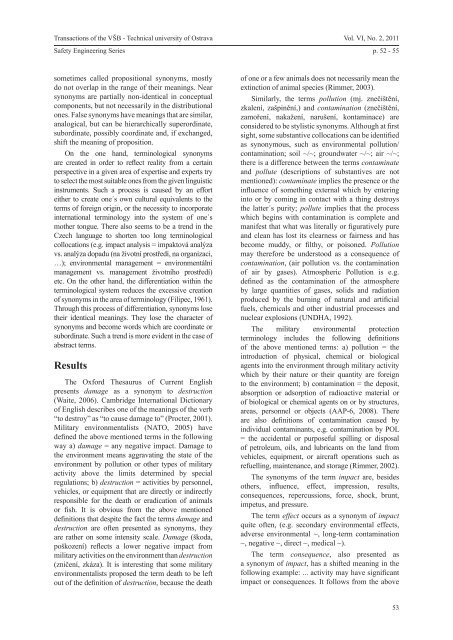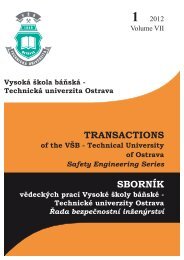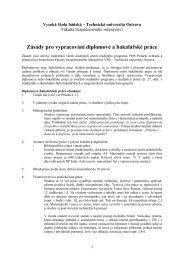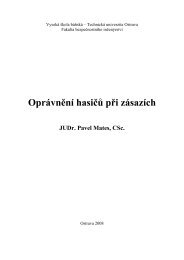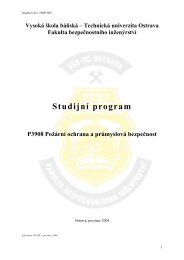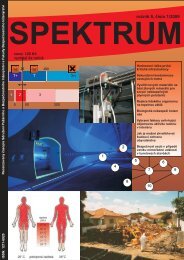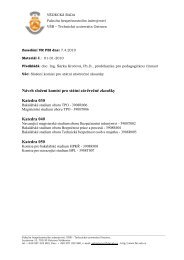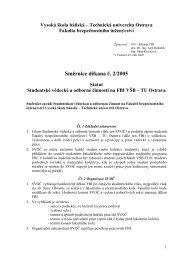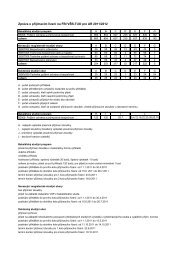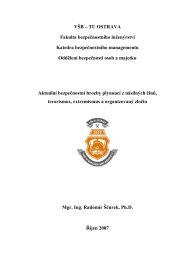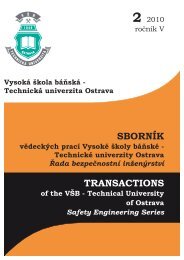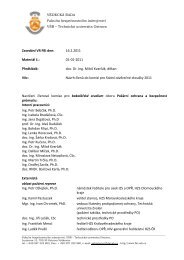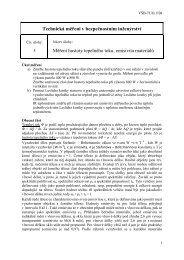Transactions - FBI - Vysoká Å¡kola báÅská - Technická univerzita ...
Transactions - FBI - Vysoká Å¡kola báÅská - Technická univerzita ...
Transactions - FBI - Vysoká Å¡kola báÅská - Technická univerzita ...
You also want an ePaper? Increase the reach of your titles
YUMPU automatically turns print PDFs into web optimized ePapers that Google loves.
<strong>Transactions</strong> of the VŠB - Technical university of OstravaSafety Engineering SeriesVol. VI, No. 2, 2011p. 52 - 55sometimes called propositional synonyms, mostlydo not overlap in the range of their meanings. Nearsynonyms are partially non-identical in conceptualcomponents, but not necessarily in the distributionalones. False synonyms have meanings that are similar,analogical, but can be hierarchically superordinate,subordinate, possibly coordinate and, if exchanged,shift the meaning of proposition.On the one hand, terminological synonymsare created in order to reflect reality from a certainperspective in a given area of expertise and experts tryto select the most suitable ones from the given linguisticinstruments. Such a process is caused by an efforteither to create one´s own cultural equivalents to theterms of foreign origin, or the necessity to incorporateinternational terminology into the system of one´smother tongue. There also seems to be a trend in theCzech language to shorten too long terminologicalcollocations (e.g. impact analysis = impaktová analýzavs. analýza dopadu (na životní prostředí, na organizaci,…); environmental management = environmentálnímanagement vs. management životního prostředí)etc. On the other hand, the differentiation within theterminological system reduces the excessive creationof synonyms in the area of terminology (Filipec, 1961).Through this process of differentiation, synonyms losetheir identical meanings. They lose the character ofsynonyms and become words which are coordinate orsubordinate. Such a trend is more evident in the case ofabstract terms.ResultsThe Oxford Thesaurus of Current Englishpresents damage as a synonym to destruction(Waite, 2006). Cambridge International Dictionaryof English describes one of the meanings of the verb“to destroy” as “to cause damage to” (Procter, 2001).Military environmentalists (NATO, 2005) havedefined the above mentioned terms in the followingway a) damage = any negative impact. Damage tothe environment means aggravating the state of theenvironment by pollution or other types of militaryactivity above the limits determined by specialregulations; b) destruction = activities by personnel,vehicles, or equipment that are directly or indirectlyresponsible for the death or eradication of animalsor fish. It is obvious from the above mentioneddefinitions that despite the fact the terms damage anddestruction are often presented as synonyms, theyare rather on some intensity scale. Damage (škoda,poškození) reflects a lower negative impact frommilitary activities on the environment than destruction(zničení, zkáza). It is interesting that some militaryenvironmentalists proposed the term death to be leftout of the definition of destruction, because the deathof one or a few animals does not necessarily mean theextinction of animal species (Rimmer, 2003).Similarly, the terms pollution (mj. znečištění,zkalení, zašpinění,) and contamination (znečištění,zamoření, nakažení, narušení, kontaminace) areconsidered to be stylistic synonyms. Although at firstsight, some substantive collocations can be identifiedas synonymous, such as environmental pollution/contamination; soil ~/~; groundwater ~/~; air ~/~;there is a difference between the terms contaminateand pollute (descriptions of substantives are notmentioned): contaminate implies the presence or theinfluence of something external which by enteringinto or by coming in contact with a thing destroysthe latter´s purity; pollute implies that the processwhich begins with contamination is complete andmanifest that what was literally or figuratively pureand clean has lost its clearness or fairness and hasbecome muddy, or filthy, or poisoned. Pollutionmay therefore be understood as a consequence ofcontamination, (air pollution vs. the contaminationof air by gases). Atmospheric Pollution is e.g.defined as the contamination of the atmosphereby large quantities of gases, solids and radiationproduced by the burning of natural and artificialfuels, chemicals and other industrial processes andnuclear explosions (UNDHA, 1992).The military environmental protectionterminology includes the following definitionsof the above mentioned terms: a) pollution = theintroduction of physical, chemical or biologicalagents into the environment through military activitywhich by their nature or their quantity are foreignto the environment; b) contamination = the deposit,absorption or adsorption of radioactive material orof biological or chemical agents on or by structures,areas, personnel or objects (AAP-6, 2008). Thereare also definitions of contamination caused byindividual contaminants, e.g. contamination by POL= the accidental or purposeful spilling or disposalof petroleum, oils, and lubricants on the land fromvehicles, equipment, or aircraft operations such asrefuelling, maintenance, and storage (Rimmer, 2002).The synonyms of the term impact are, besidesothers, influence, effect, impression, results,consequences, repercussions, force, shock, brunt,impetus, and pressure.The term effect occurs as a synonym of impactquite often, (e.g. secondary environmental effects,adverse environmental ~, long-term contamination~, negative ~, direct ~, medical ~).The term consequence, also presented asa synonym of impact, has a shifted meaning in thefollowing example: ... activity may have significantimpact or consequences. It follows from the above53


